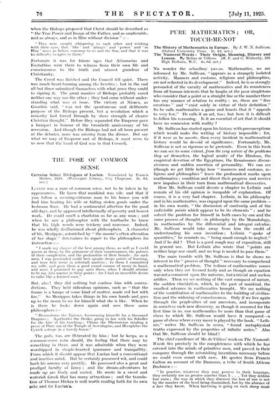THE I'OSE OF COMMON SENSE
LuctAN was a man of common sense, not to be taken in by appearances. He knew that mankind was vile, and that if
you follow a seeming-virtuous man to his house you will find him beating his wife or hiding stolen goods under the bedroom floor. He had a sentimental affection for the good old days, and he approved intellectually of poverty and honest work. He could smell a charlatan as far as any man ; and when he saw a philosopher with the toothache he knew that his high words were trickery and nonsense. Indeed, he was wholly disillusioned about philosophers. A character of his, Menippus, astonished by " the moone's often alteration of her shape " determines to repair to the philosophers for instruction :-
" I made my choyce of the best among them, as well as I could guesse at them, by the grim/lease of their countenances, the palenes of their complexion. and the profunditie of their beards : for such men, I was perswaded could best speake deepe points of learning, and were best scene in celestiall matters : to them I committed my selfe, and gave them a good round summe of mony in hand, and more I promised to pay unto them, when I should attaine to be my Ails master in these points : for I had an incredible desire to talke like a learned man."
But, alas ! they did nothing but confuse him with contra- dictions. They held ridiculous opinions, such as " that the Sunne is a lumpe of some kind of matter, made red hot with .fire." So Menippus takes things in his own hands and goes up to the moon to see for himself what she is like. When he is there he looks down again and sees those same philosophers
" Hermodorus the Epicure, forswearing himself° for a thousand Dragmes • Agathocles the Stoike, going to law with his Scholler for the hire of his teaching ; Clinias the Rhetorician stealing a peeve of Plate out of the Temple of Aeseulapius, and Herophilus the Cynick asleepe in a bawdy-house."
The gods, too, are ill-treated by him -; but he keeps, as a common-sense rnAn should, the feeling that there may be
something in them, and it was admirable when they were worshipped in simple-hearted ignorance and tranquillity.
From which it should appear that Lucian had a conventional and inactive mind. But he certainly possessed wit, and could barb his arrows very prettily. He possessed also a great and Prodigal faculty of fancy ; and the dream-adventures he made up are lively and varied. He wrote in a sweet and waterish Greek that has many attractions ; and the transla- tion of Thomas Hickes is well worth reading both for its own Bake and for Lucian's.


























































 Previous page
Previous page